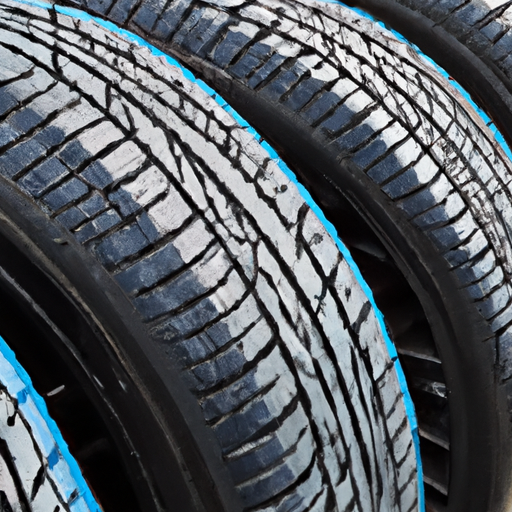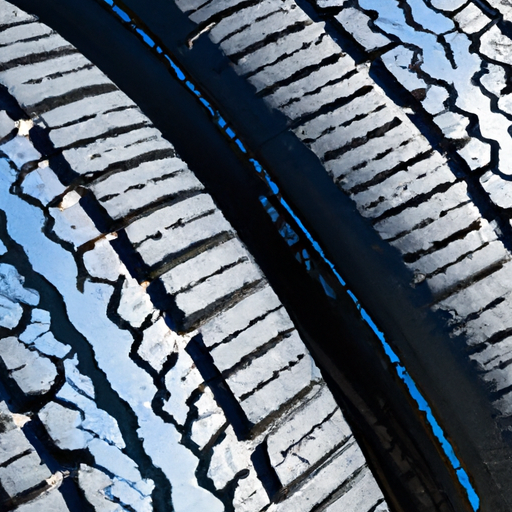Have you ever wondered about the key distinctions between summer and all-season tires? In this article, we will explore the differences between these two types of tires, shedding light on their unique features and advantages. Whether you’re planning a summer road trip or gearing up for year-round driving, understanding the contrasts between summer and all-season tires will help you make an informed decision when it comes to choosing the right tires for your vehicle.

Tread Design
Blocky tread pattern of all-season tires
All-season tires are designed with a blocky tread pattern that is suitable for a variety of weather conditions. The blocks in the tread pattern are larger and more spaced out, allowing for better traction on both wet and dry surfaces. This design also helps to evacuate water and slush from the tire, reducing the risk of hydroplaning and improving grip on wet roads.
Directional tread pattern of summer tires
On the other hand, summer tires have a directional tread pattern that is specifically designed for warm weather conditions. The tread pattern features a series of V-shaped grooves that help to channel water away from the tire, reducing the risk of hydroplaning. The design of summer tires also allows for increased grip and traction on dry roads, enhancing the overall performance and handling of the vehicle.
Tread Compound
Harder compound in all-season tires
All-season tires are typically made with a harder rubber compound. This harder compound provides a longer tread life, making all-season tires a more durable and cost-effective option. However, the harder compound also means that the tires do not offer the same level of grip and traction as summer tires, especially in hot weather conditions.
Softer compound in summer tires
In contrast, summer tires are made with a softer rubber compound. This softer compound allows the tire to conform to the road surface more effectively, providing enhanced grip and traction. The softer compound also helps to improve the overall handling and responsiveness of the vehicle, particularly in warm temperatures. However, the downside to the softer compound is that it wears out faster, resulting in a shorter tread life.
Traction
Better traction on wet and snow-covered roads with all-season tires
One of the main advantages of all-season tires is their ability to provide better traction on wet and snow-covered roads. The blocky tread pattern and the specially-designed grooves help to channel water and slush away from the tire, improving grip and reducing the risk of skidding or sliding. This is especially beneficial in regions with mild winters, where all-season tires can handle occasional snowfall or wet conditions without the need for switching to winter tires.
Superior dry traction with summer tires
While all-season tires perform well in various weather conditions, they cannot match the superior dry traction provided by summer tires. The directional tread pattern of summer tires, along with the softer rubber compound, allows for increased grip and traction on dry roads. This results in better acceleration, more precise cornering, and improved overall performance and handling.
Handling
All-season tires provide balanced handling in various conditions
One of the key advantages of all-season tires is their ability to provide balanced handling in various weather conditions. The blocky tread pattern and the combination of a harder rubber compound allow all-season tires to perform well in both wet and dry conditions. Whether you’re driving on rain-soaked roads or dry highways, all-season tires offer a stable and controlled driving experience.
Summer tires offer precise and responsive handling
On the other hand, summer tires excel in providing precise and responsive handling. The softer rubber compound, combined with the directional tread pattern, allows for enhanced grip and traction, resulting in improved cornering ability and better control during maneuvers. Summer tires provide a more sporty and performance-oriented driving experience, making them the preferred choice for enthusiasts and those who prioritize handling and responsiveness.

Braking Performance
Shorter braking distance on wet surfaces with all-season tires
When it comes to braking performance on wet surfaces, all-season tires have the advantage. The blocky tread pattern and the specially-designed grooves help to evacuate water and reduce the risk of hydroplaning, allowing for shorter braking distances. This is crucial for ensuring safe driving in rainy conditions, as it minimizes the risk of skidding or sliding when you need to come to a stop quickly.
Shorter braking distance on dry surfaces with summer tires
On dry surfaces, however, summer tires take the lead in terms of braking performance. The softer rubber compound and the directional tread pattern allow for increased grip and traction, resulting in shorter braking distances. This can be particularly beneficial in emergency situations where every inch counts, as summer tires can provide that extra level of confidence and safety when you need to stop quickly.
Cornering Ability
All-season tires have reduced cornering grip
While all-season tires offer balanced handling in various conditions, they do have some limitations in terms of cornering ability. The blocky tread pattern and the harder rubber compound, while beneficial for all-season performance, can result in reduced cornering grip compared to summer tires. This means that you may experience slightly less stability and traction when taking corners at higher speeds with all-season tires.
Summer tires have enhanced cornering grip
On the other hand, summer tires excel in terms of cornering ability. The softer rubber compound and the directional tread pattern allow for enhanced grip and traction, providing better stability and control when maneuvering through corners. This can be particularly noticeable during spirited driving or on winding roads, where summer tires offer a greater level of confidence and performance.

Road Noise
All-season tires tend to be quieter
In terms of road noise, all-season tires tend to be quieter compared to summer tires. The blocky tread pattern and the harder rubber compound help to reduce road noise and provide a more comfortable and enjoyable driving experience. This can be particularly beneficial during long trips or when driving on rough or uneven road surfaces, as the reduced road noise helps to minimize driver fatigue and enhances overall comfort.
Summer tires can produce more road noise
On the other hand, summer tires can produce more road noise compared to all-season tires. The softer rubber compound and the directional tread pattern may result in increased road noise, particularly at higher speeds. This is a trade-off for the increased grip and performance that summer tires provide. However, it’s important to note that the level of road noise can vary depending on the specific tire model and brand, so it’s always a good idea to do some research and read reviews before making a final decision.
Temperature Range
All-season tires perform well in a wide range of temperatures
As the name suggests, all-season tires are designed to perform well in a wide range of temperatures. Whether it’s hot summer days or cold winter mornings, all-season tires are capable of providing reliable traction and handling. While they may not excel in extreme weather conditions, all-season tires offer a practical and versatile solution for drivers who experience moderate seasonal changes and do not require specialized tires for winter or summer use.
Summer tires perform best in warm temperatures
In contrast, summer tires are specifically designed for warm weather conditions. They are optimized to deliver their best performance and grip in high temperatures. The softer rubber compound in summer tires becomes more pliable and provides better traction as the temperature rises. However, it’s important to note that summer tires can become less effective and potentially dangerous in cold temperatures or on snow-covered roads. Therefore, they are not recommended for use in regions with harsh winters or frequent sub-zero temperatures.

Longevity
All-season tires typically have longer tread life
When it comes to tread life, all-season tires generally have the advantage. The harder rubber compound used in their construction provides increased durability, resulting in longer tread life compared to summer tires. This means that all-season tires can last for a greater number of miles before needing to be replaced, making them a more cost-effective option in the long run.
Summer tires may wear out faster
In contrast, summer tires tend to wear out faster due to the softer rubber compound. While the softer compound provides enhanced grip and traction, it also leads to increased wear and tear. Summer tires are designed for optimal performance in warm weather conditions, but this comes at the expense of a shorter tread life. Therefore, if you choose to use summer tires, it’s important to be mindful of regular inspections and ensure proper maintenance to maximize their longevity.
Cost
All-season tires are usually more cost-effective
In terms of cost, all-season tires are generally more budget-friendly compared to summer tires. Due to their versatile design and longer tread life, all-season tires offer a cost-effective solution for drivers who do not require specialized tires for specific seasons. Additionally, since all-season tires can be used year-round, there is no need to invest in an additional set of tires or pay for seasonal tire changes.
Summer tires are often more expensive
On the other hand, summer tires tend to be more expensive than all-season tires. The specialized design and the higher performance capabilities of summer tires result in a higher price tag. Furthermore, if you choose to use summer tires, you may also incur additional expenses for purchasing and storing a separate set of tires for winter use. However, for those who prioritize performance and handling, the added cost of summer tires may be justified by the enhanced driving experience they provide.
In conclusion, there are significant differences between summer and all-season tires in terms of tread design, tread compound, traction, handling, braking performance, cornering ability, road noise, temperature range, longevity, and cost. All-season tires offer a versatile and practical solution for drivers who experience moderate seasonal changes and prefer a balanced performance in various conditions. On the other hand, summer tires excel in providing enhanced grip and traction in warm weather conditions, offering a more precise and responsive driving experience. Ultimately, the choice between summer and all-season tires should be based on your specific driving needs, regional climate, and personal preferences.


